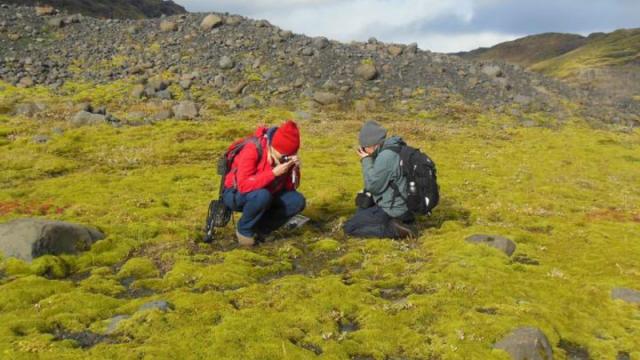For hundreds of millions of years, life on Earth was a purely aquatic phenomenon. The jump from the oceans to the continents was a monumental event, one that would irrevocably change the face of our planet. A new study suggests the first plants to make this evolutionary leap appeared much earlier than we thought.
Early life on land looked similar to this lava field in Iceland, consisting of cyanobacteria, mosses, and lichens. (Image: Paul Kenrick)
Our planet’s first terrestrial plants appeared 500 million years ago, according to new research published in Proceedings of the National Academy of Sciences. That’s a surprising figure, considering the oldest known plant fossils date back approximately 420 million years. The University of Bristol scientists who conducted the study analysed the genes of living organisms, and then combined that with what we know about the fossil record, to come up with the revised date.
It’s called the “molecular clock” technique, and it’s typically utilised in cases where the fossil record is sparse (which is the case here). Biologist Simon Ho from the Australian National University describes it like this:
The molecular clock hypothesis states that DNA and protein sequences evolve at a rate that is relatively constant over time and among different organisms. A direct consequence of this constancy is that the genetic difference between any two species is proportional to the time since these species last shared a common ancestor. Therefore, if the molecular clock hypothesis holds true, this hypothesis serves as an extremely useful method for estimating evolutionary timescales. This is of particular value when studying organisms that have left few traces of their biological history in the fossil record, such as flatworms and viruses.
Or in this case, the planet’s first terrestrial plants, which looked like moss or algae. Once on land, these plants would eventually diversify into more complex forms, such as flowering plants, trees and grass. Land plants changed our planet forever, contributing to the chemical weathering of rocks – an important element of the carbon cycle involved in regulating Earth’s atmosphere across long timescales.
“The global spread of plants and their adaptations to life on land, led to an increase in continental weathering rates that ultimately resulted in a dramatic decrease in the levels of the ‘greenhouse gas’ carbon dioxide in the atmosphere and global cooling,” Jennifer Morris, the co-lead author of the new study, said in a statement. “Previous attempts to model these changes in the atmosphere have accepted the plant fossil record at face value – our research shows that these fossil ages underestimate the origins of land plants, and so these models need to be revised.”
By using the molecular clock technique, the researchers were able to sniff out gaps in the fossil record, which suggested an earlier inception date for land plants.
“The fossil record is too sparse and incomplete to be a reliable guide to date the origin of land plants. Instead of relying on the fossil record alone, we used a ‘molecular clock’ approach to compare differences in the make-up of genes of living species – these relative genetic differences were then converted into ages by using the fossil ages as a loose framework,” said study co-author Mark Puttick. “Our results show the ancestor of land plants was alive in the middle Cambrian Period, which was similar to the age for the first known terrestrial animals.”
Because the family tree of the earliest plants is not known, the researchers played with the data to see if it would change the result. But even when they used different assumptions about the relationships between these early terrestrial organisms, the result did not change the age of the earliest land plants.
This is an important finding because scientists will now have to take the new date into account when modelling our planet’s early atmosphere. That said, the molecular clock technique does not substitute for empirical evidence; what’s really required is the discovery of plant fossils dating back to this period. Otherwise, this study is simply conjecture – albeit conjecture informed by genetics.
[PNAS]
